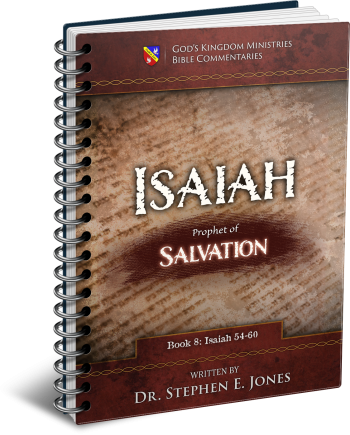Latest Posts
View the latest posts in an easy-to-read list format, with filtering options.

Isaiah is the prophet of Salvation. He is also known as the truly "Universalist" prophet, by which is meant that He makes it clear that salvation is extended equally to all nations and not just to Israel. He lived to see the fall of Israel and the deportation of the Israelites to Assyria, and he prophesied of their "return" to God (through repentance). He is truly a "major prophet" whose prophecies greatly influenced the Apostle Paul in the New Testament.
Category - Bible Commentaries

In the end, God does not want us to keep the Day of Atonement but rather to keep a Jubilee. The national day of fasting and “mourning” (as they called it) was to remember their lack of faith when they believed the evil report of the ten spies. Their fasting and prayer was to bring repentance and change, so that they would genuinely have the faith to enter the Kingdom.
Israel lacked faith at Kadesh-barnea because they had previously rejected the opportunity to hear God for themselves at Mount Horeb. When Moses invited them to draw near to God, they refused, preferring to hear Moses’ second-hand account of what God was saying (Exodus 20:19). Knowledge comes by hearing Moses, but revelation comes from hearing directly from God. Faith comes by hearing (Rom. 10:17).
Hence, the people lacked the faith to enter the Kingdom on the 50th Jubilee from Adam, and so it took 40 years to enter the Promised Land. This also set the pattern for the Pentecostal Age, where entry into the greater Kingdom was postponed for 40 Jubilees until the present time. The Day of Atonement has served as an opportunity for all of us to prepare our hearts by faith while the church was in its own wilderness.
The problem in Isaiah’s day was that the people did not understand the purpose of this national day of fasting. They were using it to try to get their own way, to seek their own will and desire, and to contend with God, hoping to change His mind and will to conform to their own carnal desires. They did not seem to realize that they were perpetuating the same problem of carnal thinking that occurred when their forefathers refused to enter the Promised Land in the days of Moses.
Some religious men proved their false humility by dressing in sackcloth to be seen of others. Jesus commented on this in Matthew 6:16-18,
16 Whenever you fast, do not put on a gloomy face as the hypocrites do, for they neglect their appearance so that they will be noticed by men when they are fasting. Truly I say to you, they have their reward. 17 But when you fast, anoint your head and wash your face, 18 so that your fasting will not be noticed by men, but by your Father who is in secret, and your Father who sees what is done in secret will reward you.
In other words, fasting should be about one’s relationship to God, not to men. Carnality takes many forms, but the two main items appear to be (1) fasting to establish one’s own will and desire by contending with God; and (2) fasting to appear righteous and humble and to be applauded by others, rather than to seek the approval of God. Either way, the single problem is that men desire their own way and are willing to do whatever it takes to change God’s mind.
Such carnal religion is the virtual opposite of the Amen principle. Jesus was the great Amen of God, “the faithful and true witness” (Rev. 3:14), who did nothing but to carry out His Father’s will. We too are called to say nothing but what we hear our Father say and to do nothing but what we see our Father do. These are the Amen people, and, in my opinion, are the overcomers who inherit the Kingdom.
It took me a dozen years to understand this principle. In the 1970’s I began to study the sovereignty of God. In 1979 I came to the place where I did not know how to pray. Should I tell this sovereign God all the things He has forgotten? How absurd! Should I treat Him like a glorified Santa Claus and tell Him all the goodies that I want? We do not always know God’s purposes for hardship, sickness, and poverty. Man’s corruptible nature is never satisfied with what we have, so nearly everyone, regardless of their economic status, seems to need more.
So I asked God to teach me to pray. In 1982 He taught me to hear His voice—imperfectly, to be sure, but real nonetheless. For the next ten years He taught me to hear without heart idols. That was a much longer process. But the crowning revelation came in 1992 when I learned the principle of the Amen.
It made sense because my friends and I had already been practicing that principle since 1985 without knowing what to call it. We had gathered weekly around a table to see what God had to say. It usually took at least two or three hours of discernment, each one receiving pieces of revelation, before we had a complete picture. Once we knew and understood the will of God, we agreed with God’s will, declared it, and then went home.
Years later, we discovered that God had been training us in the Amen principle. Yet it took years for us to realize what God had been doing. It was a revelation that God had been answering my original prayer in 1979. I simply did not realize what He was doing until His work was complete.
I see now that God’s complaint against Israel in Isaiah 58 is resolved only when we learn to seek His face, His will, and His desires. We must have faith that God knows what He is doing, even when our carnal minds disagree. But this first hinges on whether or not we believe that God is actually sovereign.
Second, it also hinges on whether or not we believe that God is love and that He actually cares about us as individuals. How often in those early days I felt like God was a child abuser. After all, look what He did with Jesus! I did my fair share of complaining. My flesh objected to the prospect of dying. I did not realize that all of this divine discipline was a time of fasting in itself.
Fasting does not have to involve food or drink. Fasting is a discipline of the flesh, being willing to be deprived of any necessity for life to achieve a greater goal. Fasting is a discipline that helps kill the flesh in order to be raised from the dead at the other end. So, as we will see shortly, Isaiah shows that fasting is not what we think it is. Abstaining from food or drink is only one manner of discipline. We should see that God’s disciplines are the greater times of fasting, for we then learn to subject our desires to God’s desires.
One does not learn such things overnight. It can take a long time for the will of the flesh to be subject to God. My own discipline took more than ten years, because my flesh did not go to the cross willingly. Yet I can honestly also say that I persevered by faith, knowing in my innermost being that God really did love me. At every step of the way, I saw evidence that He had not forgotten me in spite of His discipline. Today I can see more clearly how all things worked together for good (Rom. 8:28), and I would not trade those early hardships for the world.
Isaiah 58:6, 7 says,
6 Is this not the fast which I choose, to loose the bonds of wickedness, to undo the bands of the yoke, and to let the oppressed go free and break every yoke? 7 Is it not to divide your bread with the hungry and bring the homeless poor into the house; when you see the naked, to cover him; and not hide yourself from your own flesh?
Once we understand that fasting is more than just abstaining from food or drink, we can see it from God’s greater perspective. When people do the will of God, putting down their own desires of the flesh, they are exercising “the fast which I choose.”
Fasting is a way of life, not a time of abstention. The religious Jews fasted twice a week by depriving themselves of food. We, however, are to fast every day of the week. We stop feeding the flesh and deprive it of asserting its will. In other words, we seek His will, not our own.
When Jesus said in the Garden, “not My will but Yours be done” (Luke 22:42), He was fasting in this way. Instead of looking to the comfort of His own flesh, He went to the cross “to loose the bonds of wickedness, to undo the bands of the yoke, and to let the oppressed go free.” What He did on a grand, worldwide scale, we are also to do in our own limited ways.
Jesus was the Bread of Life, born in Bethlehem (“House of Bread”) and placed in a manger at His birth to feed the world. His gospel (basar) was His flesh, which men were to eat in order to have life in themselves (John 6:53).
To feed and care for the poor is good, but this is just one manifestation of a true fast. The deeper principle is to feed the poor with the gospel of Christ, for this is the true bread that alone can satisfy the inner hunger. When Jesus fed the 5,000, He did so in a two-step process. First, He broke the bread and gave it to His disciples (Mark 6:41). The disciples broke the bread again and thereby fed the 5,000. This signified their willingness to be broken as well, following the example given to them.
This signified how His own body was to be broken to feed the world (Matt. 26:26). The principle shows that once we have partaken of Christ’s flesh, we become what we have eaten. We then, as the body of Christ, may feed the world in like manner.
The gospel (basar) that we preach is not merely from intellectual book knowledge that has filled our heads; it is the gospel of Christ that has become the core of our being.
Fasting is God’s way of preparing us through discipline and deprivation to feed upon Christ’s flesh alone so that we may come to the place of the abundant life. Only then can we truly feed all those who hunger and thirst for righteousness.
We cannot impart what we do not have. Bible study is good, but its purpose is to assist in hearing the word.
In my early years, I studied the Bible, but it was only later that I began to hear Him speak and to learn the revelation of the words that I had studied. I studied the law in the late 1970’s, but only in the 1980’s did I begin to gain an understanding of the spirit of the law.
That revolutionized my life and my entire way of thinking.